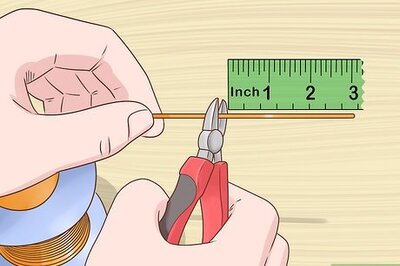
views
Setting the terms for the break

Discuss the reason for the break with your boyfriend. It's no good shouting "it's time we had a break from each other" and then storming off. The decision to take a break in a relationship is a really tough one and if you don't take it together, in a calm and considered manner, it bodes ill for the outcome. Find a moment to sit down together and be honest with one another. Talk about what has brought both of you to this point and why you think a break would be a healthy option right now.

Listen to your boyfriend's concerns, reasons and thoughts. Do not interrupt or fob off his worries. You both need to hear each other clearly, without passing judgment.

Reach an agreement on what this break means for both of you. This is about setting the ground rules and your hopes for reconciliation post-break. It is an important time to reassure each other that this is about clearing your heads, determining what you both want from the future and being absolutely sure about getting back together. Set ground rules you can both agree on.

Discuss what will change in the relationship and what will stay the same. For most people, it is not an excuse to fool around; it's important to make that clear. Determine how each of you will deal with approaches from other people who find out you're on a break; that will help to quell the anxiety that a new relationship might be inserted into the space. What changes do you think will be needed? What changes does your boyfriend want? Reach a happy compromise in relation to each other's wants. What will stay the same without feeling awkward or uncomfortable? Will you continue to talk to one another face-to-face? Will you use social media to stay in touch? Will you take a complete break from communicating with each other? Will you set times to catch up and review how things are going? You need to face these questions now, and not just wander off blindly in the hope that things will resolve themselves as the break takes place. Things unsaid have a way of turning into confirmation that whatever you or he wants goes.

Consider deciding how long the break will be. It could be a week, a month, six months, etc. Alternatively, you may prefer no set time, just subject to review and mutual agreement some time down the track.
During the break

Once the break starts, follow the rules you agreed on.

Stay busy. Create an activity list. This will give you an opportunity to look forward to each new day that approaches, instead of pacing and worrying about if he will call. It is important to learn that your life should never revolve around one single person. That only sets you up to be devastated if they end up wanting a break up.

Invest more time in doing work or studying. This can be your time to shine academically or professionally.

Devote more time and energy to doing things that make you happy. When you stay in alignment with what makes you happy and gives you meaning, it can support you to stay in alignment with your best life (including your best love life).

Be more social. Meet new people and try new things. Create a balance between the process of healing, self-care, and grieving and also try out new, small, or big life experiences.

Re-connect with old friends you may have neglected. Selecting family members and friends you trust and feel safe to be vulnerable with is vital to your healing, renewing, and rebuilding.

Avoid spending too much time by yourself. That said, learn to tell the difference between loneliness and solitude. Solitude is the time for you to reflect about your future, your wishes for the relationship and to consider your feelings about the break. Use times of solitude to write your journal, write out your feelings and prepare lists of issues you want to raise with your boyfriend.

Consider avoiding hanging out in situations with a bunch of couples. If you feel like the odd one out, you may end up losing your nerve and feeling awful. You might also make poor decisions based on what everyone else has; it is best to hang around with people in all sorts of different stages of life.
Discussing the future together

Catch up now and then. You'll both need to reassess the direction things are going from time to time, so it's important to talk at least for the purposes of determining how both of you are feeling about the future. This could be a two-weekly, monthly or even quarterly meet-up. Choose what suits both of you. Try not to rush things though; give each other sufficient time to have done some good thinking before discussing "what next".

Be honest with your boyfriend about your questions and concerns. Keep notes about the things that occur to you while contemplating the future of your relationship together. It can feel overwhelming when you get back to together and you may forget to raise some of the key issues that you really want addressed. Suggest that he does the same thing, so that you can "compare notes" and not leave the important things left unsaid.

Use assertive statements when expressing yourself. For example: "I feel _ when you _, and I would appreciate it if you would _, instead of _."
Reaching a decision

Consider how you feel after the break. Whether you've set a deadline or you've mutually agreed that it's time to decide "what next", you must be honest with yourself. Do you want the relationship to resume or has the break changed your perspective and you think that it'd be best if the two of you just stayed friends? Be careful of feelings of loyalty. While it's noble to be loyal, this isn't the reason for staying with someone when the fire has died out. You can transfer the loyalty to a friendship. Be aware of his feelings but be careful not to let these take over your own feelings. For example, he is really sad and disappointed that you've decided not to resume the relationship, avoid feeling obliged to resume it just because of his sadness. It will pass.

Think about how you will react if you wish to continue with the relationship but he doesn't. Since this is a real possibility, and you have probably harbored a lot of fantasy notions about things going back to the way they were, it can be a real whammy. What is really important is to use the break to reach acceptance that this is as much a possible outcome as resuming the relationship. Consider what you will do if you do break up for real and you will need to move forward. This is where the "keeping busy" and resuming your other social linkages comes to the foreplay; it will hurt to know things aren't going on but you're not being thrown back into a void. Rather, you have friends, family and your own pursuits to fall back into.

Think about how you will react if both of you wish to resume the relationship. This will be a challenge too, because the time apart was spent thinking things through and possibly reaching conclusions you hadn't wanted to face before. It is really important to talk about what feelings you had during the break, how these have changed your perspective and what changes you want to bring to the relationship and into the future. Listen to his changed perspective too. Seek to incorporate each other's different perspectives into a new and refreshed relationship.




















Comments
0 comment